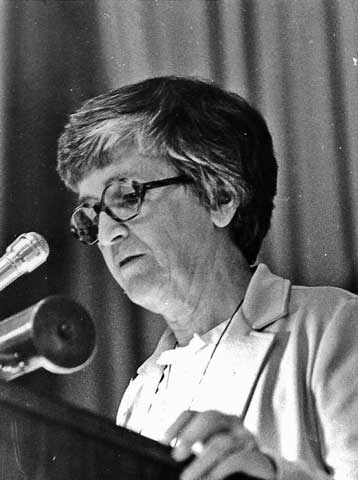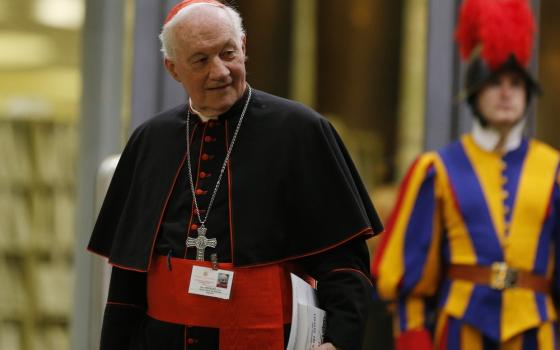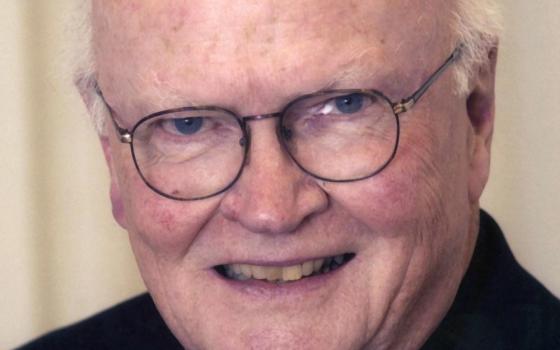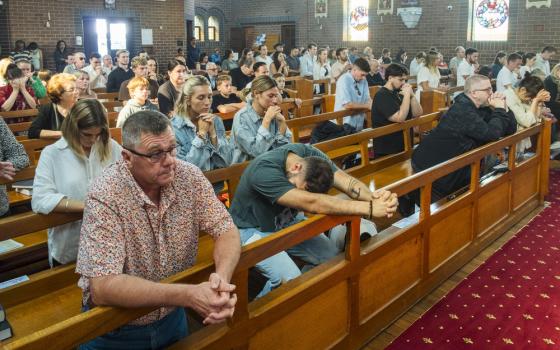
St. Joseph Sr. Bette Moslander, "a quiet woman of small stature" who for the past 50 years was a powerful voice for women in the church, died March 22 at age 92.
In addition to 18 years in leadership positions in her own community -- the Sisters of St. Joseph of Concordia -- Moslander had national and international roles throughout the decades following the Second Vatican Council.
Her funeral Mass was March 25 at the Nazareth Motherhouse in Concordia, and she was buried in the Nazareth Cemetery. Her longtime friend and colleague St. Joseph Sr. Marcia Allen was eulogist.
In a profile of Moslander published a year ago, St. Joseph Sr. Sherryl White explained, "A woman of vision, Sister Bette saw the approaching changes as the Church was swept into the 1960s."
To help ensure the Sisters of St. Joseph were prepared for the changes that would come out of Vatican II -- which began in October 1962 in Rome -- Moslander was sent to the Lumen Vitae International Institute of Religious Education in Brussels for a year.
"During that year," she wrote in a 2002 life review, "I became deeply involved with the developments in Rome that were so radically to affect our lives in the near future. ... There is no doubt that this year was transforming my sense of Church and my development as a woman religious."
When Moslander returned to Kansas, she was almost immediately elected to leadership in the Sisters of St. Joseph, and would eventually serve for 18 years, including two terms -- from 1975 to 1983 -- as president.
In her life review, Moslander recalled those "tumultuous years" following Vatican II when religious communities were called upon to renew their spiritual heritage and structures.
The Sisters of St. Joseph held their "General Renewal Chapter" in 1969. Moslander wrote, "It was an event of earthquake proportions for all of us. ... It changed every aspect of our lives. ... They were, for many of us, days of great hope and enthusiasm."
But, as White wrote in her profile of Moslander, "the changes, the empowerment of freedom for the sisters, came at a price for the community. Like other congregations across the country, members were leaving. ... Those who stayed no longer wanted to staff the large institutions."
During Moslander's presidency, the sisters faced tough decisions about the future of their eight hospitals, a skilled nursing facility and several schools, as well as Marymount College in Salina, Kan. The health care facilities and schools would eventually be turned over to local organizations, sold or closed, while Marymount was given to the Salina diocese, which operated it for a few years before closing it in the late 1980s.
At the same time, Moslander became increasingly active in the Leadership Conference of Women Religious. She was elected to LCWR's board and executive committee and served as president from 1981 to 1982. She was also a U.S. representative in the International Union of Superiors General.
Shortly after Moslander left LCWR leadership, Pope John Paul II named San Francisco Archbishop John Quinn to lead a Vatican-mandated study of religious life in the United States. Quinn asked Moslander to join the advisory committee to the commission in 1983, as its official liaison to LCWR.
In that capacity, she directed the study of the decline of vocations, an interdisciplinary effort that revealed the cultural phenomena changing religious life in radical and rapid ways.
Moslander worked with the Quinn Commission for three years, calling it "a highlight in my life." When she delivered the final report, she became the first woman to address the National Conference of Catholic Bishops, according to LCWR.
Moslander was born Feb. 5, 1923, in Grand Island, Neb., and earned her bachelor's degree at Marymount College in Salina. In 1953, she completed her doctorate in religious studies and theology at St. Mary's College in Notre Dame, Ind., and then joined the faculty of the theology department at St. Teresa's College in Kansas City, Mo.
In 1958, at age 34, she was received into the Sisters of St. Joseph of Concordia and given the name Sr. Thomas More. She had already been teaching Scripture and theology to the other postulants and novices, and then she joined the faculty at Marymount.
Returning to Concordia in 1989, she continued a decadeslong collaboration with Allen focused on the study and renewal of religious life. From that collaboration grew the Bearers of the Tradition program, a monthlong workshop and retreat to educate younger members of the various American St. Joseph congregations about their origins and spirituality.
"What we didn't count were those [sisters] who signed up from France, Australia, Japan, India, Wales, Egypt, Canada, Mexico and Argentina," Moslander told White in her profile.
From the study of the French origins of the Sisters of St. Joseph grew one of Moslander's most recent passions: the agrégée movement.
Drawing from the congregations' 17th-century origins, Moslander reinvented and revitalized a form of membership -- named for the French word for "attached to" or "aggregated with" -- that is non-canonical but is vowed. Since 2006 when the sisters' senate approved agrégée membership, 11 women have professed the single vow of fidelity to the congregation. Another five are in the process of prayer and study to become agrégée sisters.
[Sarah Jenkins is communications director for the Sisters of St. Joseph of Concordia.]



